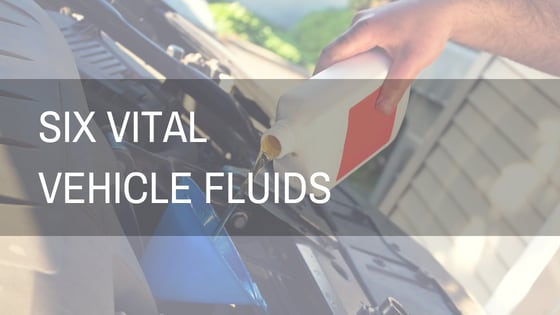
The bulk of your vehicle’s maintenance should be preventative. That is, as long as you follow the manufacturer’s recommended service intervals it’s unlikely you’ll run into unexpected mechanical repairs.
Maintenance service is largely covered under one of three categories. One is belts and hoses. Second are the filters: air, oil, and fuel, but also cabin air filters. The third is the fluids that flow through your vehicle. A modern vehicle simply couldn’t exist without these fluid systems. Furthermore, if they’re neglected they could cause system failures that can be expensive to repair.
Instructions on checking all six of the systems that we have listed below are included in your vehicle’s owner’s manual. You can also have the certified technicians at Fletch’s check any or all of these systems on your behalf, or even teach you how to check them yourself if you’d like.
Engine Oil
This is the process in which drivers are most familiar. With an emphasis on reducing internal engine friction (lowering emissions and improving fuel economy) modern engines sometimes utilize synthetic oils and or have less oil in the engine than their predecessors. Check your owner’s manual for specific instructions as to when and how to check the oil to get the most accurate reading. The same goes for oil change frequency. The owner’s manual will provide you with the recommended interval for normal driving and for driving in severe conditions, which is more common than you might think. Some vehicles use a sophisticated computer-based system that recommends oil change intervals based on the actual use of the vehicle. If you have any questions as to which system or schedule to follow, the Service Advisors at Fletch’s will be happy to help.
Transmission Fluid
The automatic transmission fluid (ATF) is optimized for the special requirements of an automatic transmission, such as valve operation, brake band friction, and the torque converter as well as gear lubrication. You check your automatic transmission fluid the same time as your engine oil, with the exception in most cases that the vehicle should be running per the frequency listed in your owner’s manual. Unlike engine oil, transmission fluid is part of a closed system, so it should never be low (which would indicate a leak that should be addressed as soon as possible). Smell the fluid on the dipstick, which should be red and not smell burnt. If it shows discoloration or gives off a scorched smell, have it inspected by a Certified Technician at Fletch’s to determine whether the transmission requires repair or simply a fluid change.
Engine Coolant/Anti-Freeze
Engine coolant/anti-freeze keeps your car, truck, or SUV running cool in the summer and keeps it from freezing up in the winter. If you ever run low on coolant, your engine, radiator, and hoses will either overheat if it’s summer or freeze if it’s winter. Unfortunately the properties in coolant/anti-freeze that allow it to function better than straight water wear out over time. Check your owner’s manual for instructions on when you should check your coolant and how frequently the coolant should be replaced or renewed.
Brake Fluid
Brake fluid is formulated to capture water that comes into the braking system from atmospheric contamination. Water is bad news for a braking system as it’s compressible (which makes the brakes spongy), and it creates the risk of a metal brake line rusting through causing a partial system failure. So brake fluid needs to be removed and replaced per the manufacturer’s schedule listed in your owner’s manual. In addition, check the brake fluid reservoir for the color of the fluid. Clean brake fluid looks somewhat like oil. If it’s brown, it’s contaminated and definitely time to replace it, and if it’s low (marked on the reservoir) it could be the sign of a leak.
Power Steering Fluid
Power steering uses a pump to push a piston that’s attached to the steering rack. Turn right and the pump sends fluid to the appropriate piston. If the power steering fluid is low, the first indication you may get is a squeal when you turn the wheel all the way to the right or left while parked with the engine running. Any drop in fluid usually indicates a leak in either one of the hoses or the seals inside the ram. As always, these can usually be avoided by performing the preventive maintenance outlined in your owner’s manual.
Washer Fluid
While most people who list oil and brake fluid as critical to the operation of their car, truck, or SUV, they rarely think of washer fluid as important. Nothing could be further from the truth. Here in Michigan, as snows melt and streets and highways get wet with run-off, it’s a constant battle to keep your windshield clean. Washer fluid is a consumable so there’s no schedule to replace it. Instead, as the vehicle operator, you should take the opportunity at every other fill-up to lift the hood and eyeball the washer fluid tank.
So whether its regular scheduled fluid maintenance or a concern over a low fluid level or bad smell, bring your car, truck, or SUV into the certified technical experts at Fletch’s and they’ll have it sorted out in no time.